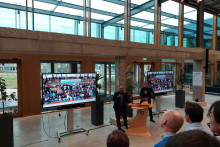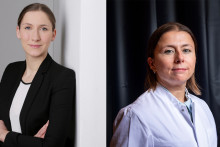These are turbulent times for Dutch higher education. The influx of foreign students, the anglicization of higher education and the fact that government funds are being funnelled into science and technology programmes (and taken from humanities and social sciences programmes) continue to cause upheaval.
But from a distance, Dutch education looks healthy, say head researchers at OECD Thomas Weko and Gillian Golden. ‘We use the Netherlands as a prime example in other countries.’
Still, that doesn’t mean that the Netherlands can sit back and relax. Last week the researchers came here to talk to officials, educational institutes and other involved parties about their vision for Dutch education. Right before the summer they wrote a report on this topic.
Creating more focus
The two researchers say they do not have a blueprint for the ideal educational system. ‘We look at ideal characteristics’, explains Golden, ‘such as equity, effectiveness, quality and flexibility.’ She believes making international comparisons can help create more focus.
However, therein also lies the limitation of their approach. The Netherlands is performing well but the researchers can only review aspects that can be compared on an international level, such as cost, numbers of students and diplomas.
They do see that a lot of foreign students are coming to the Netherlands. So many, in fact, that the Netherlands is almost at the level of English-speaking countries. They also see that in comparison, a smaller number of students stay in the Netherlands after graduation.
Which is why they fully understand the Government’s recent suggestion to require future foreign students to learn Dutch. ‘My daughter is studying in Potsdam’, explains Weko. ‘We knew in advance that half of the programme would be taught in German. So she is learning German, that’s no problem.’
No Finnish
Dutch is said to be a difficult language to learn, but he thinks that is nonsense. ‘Good heavens, it’s not Finnish is it? You don’t have sixteen cases, right? It’s not too much to ask that foreign students learn at least some Dutch.’
They see another problem with the anglicization of Master’s education in particular: equity is at stake. Golden explains: ‘It is not easy to continue your education if you have just completed a Dutch-taught Bachelor’s degree at a university of applied sciences and now want to enrol in a Master’s degree programme at a research university, because many Master’s programmes are now taught in English.’
Critics of the anglicization of higher education also fear that Dutch will eventually become a second-rate language, which would lead to the impoverishment of Dutch culture. This does not seem strange to Weko as it is also a matter of concern in other countries.
‘You need to nurture music, poetry and literature. This should be a priority for universities and other places’, says Weko. ‘And yes, you are going to lose money on that. That’s just the way it is.’
Latvia
Take Latvia for example, they say. Latvia has a population of two million and was occupied by the French, Russians and the Germans throughout the centuries. Latvian education also has an international focus, but their universities are also eager to pass on their country’s culture.
They also mention Denmark. The Danish government felt that universities were offering too many English-taught programmes and decided to put a stop to that. In that sense the Danish are ahead of the Dutch.
A stronger emphasis on Dutch will benefit foreign students as well, according to the researchers. ‘International students can feel stressed, because they are caught in an English-speaking bubble. They are on the outside looking in and are having trouble integrating.’
Lots of experiments
There’s a lot to be said about Dutch higher education. That there are not enough short-term programmes at universities of applied sciences and that there is a shortage of PhD positions, for example. There are not that many options for mature students who wish to enrol at new programmes. And that there is a very rigid difference between education at universities of applied sciences and research universities.
But there’s one thing that really stands out for the researchers. Dutch education highly values reflection and is always looking at what other countries are doing. Weko: ‘And Dutch people are always trying things out. You really love to experiment. That is truly a part of your culture.’







